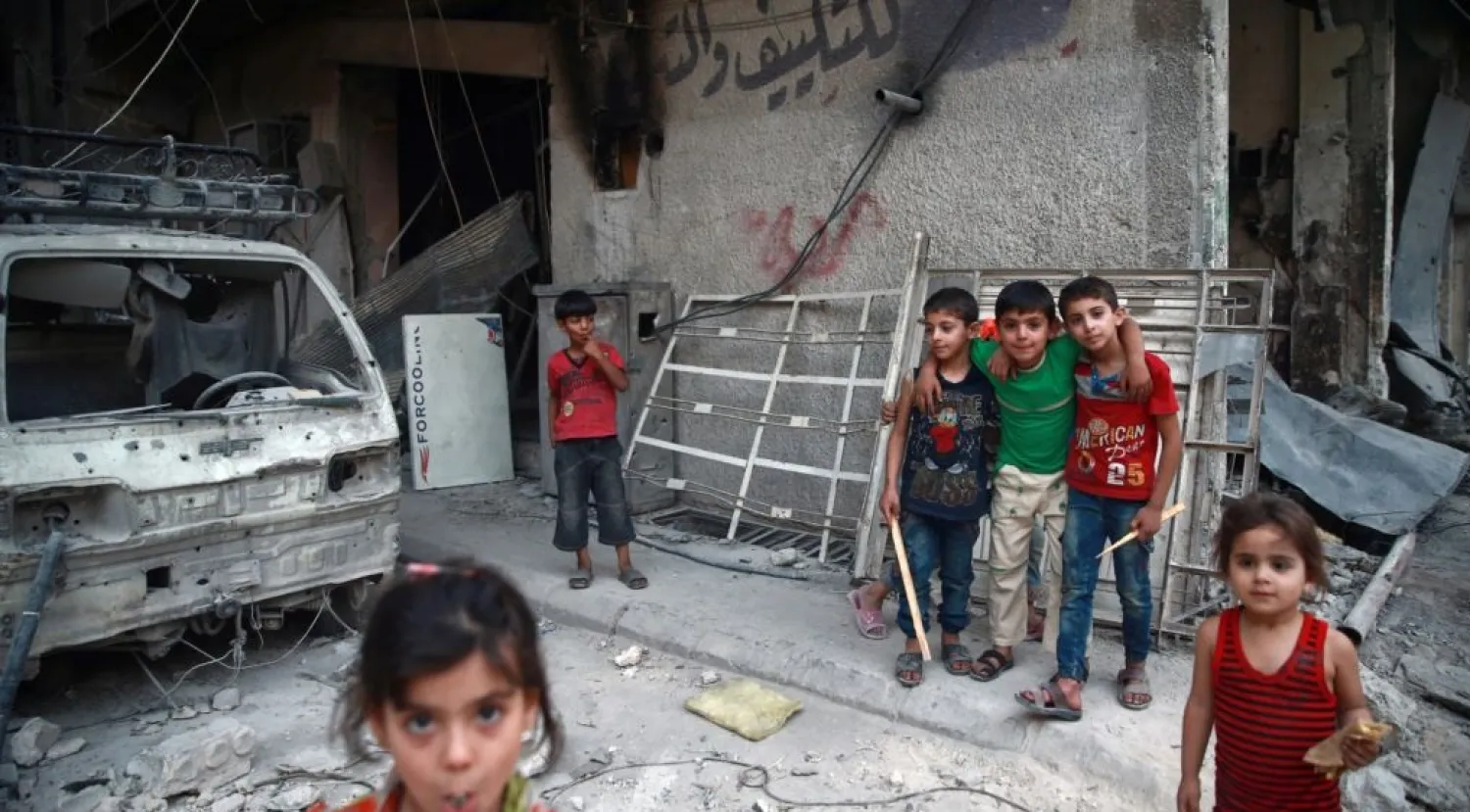“We are alive, but dead,” a frequent line the families and residents of eastern Ghouta in Syria use to best express the zombie-esque living conditions they experience.
A regime-imposed siege had left the area in dire humanitarian state. Not only so, but incessant shelling has ravaged the rebel-held area for four consequent years.
Speaking to Asharq Al-Awsat, Abu Hussain, father of three, says that he has been left powerless in terms of providing for his family, after regime troops had taken over their hometown and forcibly displaced locals.
“Since the regime took control of our town, I could not do any work because there were no jobs in the area,” Abu Hussain said after moving to a town east of the capital.
Breadwinner of a modest family of five, Abu Hussain also complained against regime forces cutting off relief routes.
“Especially since most of the agricultural land was denied to us-- we lived off some of the relief aid provided by the relief societies. This aid has been halted due to the tightened blockade on us,” he adds.
Abu Hussain’s children are only three out of an estimated 400,000 locals displaced. Making matters worse, price hikes have sizably affected relief initiatives.
Evening the score after its inability to regain control of the area, the regime's army and affiliated militias have targeted eastern Ghouta with a host of shelling episodes accompanied by a total blockade—reinforcing a policy of "starve or surrender" to areas outside its control.
Abdullah, a civil society activist, said “families' savings are being depleted”.
Blaming the siege which encapsulates large swaths of Ghouta land, he says that families are left to suffer a great deal when it comes to securing income.
"Even the only former crossing (the refugee camp crossing), which regime forces had allowed through the smuggling of food aid has been shut down,” Abdullah told Asharq Al-Awsat.
Huge increases in expense, the failure of development projects to achieve any profits, the lack of job opportunities due to the loss of raw materials, and the high prices due to the blockade left many families dismayed.
Speaking with cynicism, another civil activist, Mohammed, describes United Nations aid as “mere crumbs.”
“It does not affect the living conditions of families because they do not reach a fraction of the size of what is the UN expected to deliver on with its humanitarian organizations," he notes.
"Ghouta holds some 75,000 besieged families, while each UN-led operation helped in the entry of 5,000 relief baskets at each time,” Mohammed complained.
Regime forces barring any entry of relief and medical supplies into the 104-square-kilometer eastern Ghouta, just 10 kilometers from the center of a relaxed regime capital, Damascus, has also resulted in the outbreak of diseases and pests.
Victims mostly affected by the harsh conditions are children and the elderly.
According to reports, activists and medical sources in the countryside of Damascus, 527 infants have lost their lives since 2014, due to lack of proper medical supplies and blockade-induced famine.
Shadi Diab, a ten-year-old boy affected by the eastern Ghouta siege, suffers from renal failure after being born with a barely-functioning left kidney.
Despite being born ill, Diab found himself forced to work at a modest store to provide for his family after his father was killed in the early outbreak of the Syrian civil war.
"My mother has been left breathless in her errands to provide us with medicine, and most of the time she fails—but we are mostly preoccupied with securing a simple meal for each day,” Diab tells Asharq Al-Awsat.
Most families suffering the blockade are limited to one meal a day which popularly comprises boiled cabbage or cauliflower, but never rice or wheat byproducts which are impossible to obtain with rocketing prices.
Diab’s mother says that her kids are provided with a bare-minimum orphans’ allowance of $75 distributed among the three children, each getting $25.
That kind of money is not closely enough to cover medicine they need on a daily basis, she says.
Regime forces did not exclude the bombing of vital and service facilities in eastern Ghouta, targeting schools and healthcare centers.
Many students were forced to stop going to school as of last November.
A raid carried out by regime fighter jets on October 31, demolished a school in Jisreen town, killing five civilians, including 3 students. Another raid on November 25 targeted a nearby orphanage-linked gardening facility.














